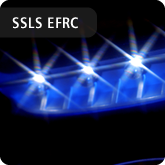Sandia researchers have developed new high-resolution magic angle spinning (HRMAS) nuclear magnetic resonance (NMR) spectroscopy techniques to investigate diffusion in polymer membranes. By coupling HRMAS NMR with pulsed field gradient (PFG) diffusion techniques, the team has demonstrated the unprecedented resolution of individual chemical species within a series of fuel cell anion exchange membranes (AEMs). The [...]
Clean water scarcity leads to disease, death, and often international tension. Limited clean water supplies face further stress due to its required use in a number of industrial processes. Reverse osmosis (RO) is currently the best method of desalination (making fresh water from seawater), but the energy requirements and costs for this process are tremendous [...]
A lot that needs to be done to enable the transition towards larger shares of renewables in the power mix. The 5th International Conference on Integration of Renewable Energy and Distributed Energy Resources [4–6 December 2012, Berlin, Germany] brought together global participants from the energy sector to discuss the transformation of the power system, the challenges [...]
Sandia National Laboratories’ unique experimental capabilities to quantify the effects of hydrogen on structural materials at high pressures are one of the reasons it was chosen to be a part of the International Institute for Carbon-Neutral Energy Research (I2CNER). I2CNER is an international consortium established in Japan in 2007 with a main objective to develop [...]
At Sandia National Laboratories, researcher Cy Fujimoto, in partnership with Automotive Fuel Cell Cooperation (AFCC), is developing a polymer electrolyte membrane (PEM) that can operate optimally with minimum on-board humidification and low gas crossover. Current fuel cell vehicles run optimally when the air and hydrogen fuel is humidified, which requires high pressures and additional systems [...]














 RSS
RSS Google+
Google+ Twitter
Twitter Facebook
Facebook LinkedIn
LinkedIn YouTube
YouTube Flickr
Flickr